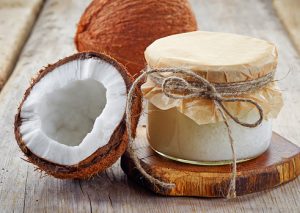 Coconut oil can help control the fungal pathogens in Candida albicans – yeast infection. The findings come from Tufts University where researchers conducted their study on mice and found that coconut oil was successful in controlling pathogen overgrowth. Candida albicans found in human gastrointestinal tracts (GI) can lead to infections of the blood, including invasive candidiasis. The research suggests that dietary approaches may be a viable alternative to antifungal drugs to help decrease infection.
Coconut oil can help control the fungal pathogens in Candida albicans – yeast infection. The findings come from Tufts University where researchers conducted their study on mice and found that coconut oil was successful in controlling pathogen overgrowth. Candida albicans found in human gastrointestinal tracts (GI) can lead to infections of the blood, including invasive candidiasis. The research suggests that dietary approaches may be a viable alternative to antifungal drugs to help decrease infection.
Candida albicans is commonly found in the GI tract, but when the immune system becomes compromised it can spread outside of the GI tract, which leads to disease. Antifungal drugs are commonly used to treat Candida albicans within the gut and prevent it from spreading to the bloodstream.
Advertisement
The research team conducted their investigation on mice to determine the effects of three different dietary fats on Candida albicans: Coconut oil, beef tallow and soybean oil. A control group was fed a standard diet for mice.
The mice that consumed the coconut oil saw a reduction in Candida albicans in the gut compared to the other groups. Coconut oil, or coconut oil mixed with beef tallow, reduced Candida albicans nearly 90 percent more than just beef tallow alone.
Research lead, Carol Kumamoto, Ph.D., said, “Coconut oil even reduced fungal colonization when mice were switched from beef tallow to coconut oil, or when mice were fed both beef tallow and coconut oil at the same time. These findings suggest that adding coconut oil to a patient’s existing diet might control the growth of C. albicans in the gut, and possibly decrease the risk of fungal infections caused by C. albicans.”
How coconut oil is effective against Candida infections
 Coconut oil can be effective for Candida because it is a powerful antifungal. Coconut oil kills Candida cells by interfering with the cell walls.
Coconut oil can be effective for Candida because it is a powerful antifungal. Coconut oil kills Candida cells by interfering with the cell walls.
Coconut oil has three active ingredients – lauric, capric, and caprylic acid – that have antiviral, antifungal and antimicrobial properties. It is these ingredients that Candida cannot become resistant to. These ingredients can also target bad bacteria while leaving good bacteria present.
Because sugar feeds Candida, coconut oil can act as a natural sweetener and be used as a sugar substitute, so you don’t have to add sugar to your diet, which can further Candida.
Coconut oil is also an antioxidant, so it can kill excess yeast and other fungal overgrowth within the body. Coconut oil can also boost the absorption of other vitamins and nutrients.
Coconut oil can also help fight against Candida of the skin by forming a protective layer and can help heal yeast infections quickly. Furthermore, it is generally safe for all skin types and can protect against chaffing as well.
How to use coconut oil for Candida (yeast infections)
There are many different ways you can use coconut oil for Candida including topically or by ingesting it.
Apply to the skin: Coconut oil can be applied directly onto the skin. Ensure the area is dry and clean and apply a few drops of it onto the area and massage into skin. Repeat this a few times a day in order to promote quick healing.
 Incorporate it into your diet: Coconut oil can be ingested and can be used to make many meals you already eat. Coconut oil can be a replacement for butter and cooking oil or can just be ingested on its own in a teaspoon amount.
Incorporate it into your diet: Coconut oil can be ingested and can be used to make many meals you already eat. Coconut oil can be a replacement for butter and cooking oil or can just be ingested on its own in a teaspoon amount.
Wash with coconut oil: You can also replace your body soaps with coconut oil. Mix coconut oil with water and use it to clean yourself. For vaginal yeast infections dip an unbleached tampon in coconut oil and leave it in the vagina for up to eight hours – overnight while sleeping is best.
Coconut capsules: If you’re not fond of the taste of coconut oil, you can get it in capsule form, which is easier to take.
Home remedies for yeast infections other than coconut oil
There are other natural remedies aside from coconut oil that can be beneficial in helping cure yeast infections. They include:
- Apple cider vinegar – consuming apple cider vinegar diluted in water a few times a day or soaking in it can improve Candida.
- Yogurt – applying plain, unsweetened yogurt to an affected area can relieve burning and itching sensations.
- Tea tree oil – when diluted in water tea tree oil can be applied to affected area.
- Olive leaf extract – cover chopped olive leaves in vodka and allow to soak in a dark space for four weeks. Drain and apply the liquid to the affected area.
Health benefits of coconut oil besides controlling Candida
Aside from helping control Candida, coconut oil provides many other benefits as well. See below for the health benefits of coconut oil.
 Coconut oil contains healthy fats that can be turned into energy quickly.
Coconut oil contains healthy fats that can be turned into energy quickly.- Populations that consume coconut oil have lower incidences of heart disease.
- Coconut oil provides energy and helps you burn more fat.
- Ingredients in coconut oil fight off bacteria and fungus.
- Coconut oil keeps you feeling fuller, longer making you eat less.
- Fatty acids in coconut oil turns into ketones, which can help reduce seizures.
- Coconut oil can help reduce cholesterol and lower the risk of heart disease.
- Coconut oil protects against hair damage, moisturizes the skin and works as a sunscreen.
- Coconut oil can help boost brain function.
- Contains vitamins like E, K and iron.
- Coconut oil can help boost the immune system.
- Coconut oil can help aid in digestion.
With all the benefits of coconut oil, and with all of its many uses, you should try to incorporate it into your diet and daily life.
Related Reading:
Cooking oils compared: Which to use or avoid for health benefits
You’ve likely heard a variety of opinions when it comes to cooking oils. Oil is bad. No wait, it’s good. Well, then it should be limited. No – enjoy it in large amounts! Slow down! When it comes to oil, especially those for cooking, it seems health advice is all over the map. This can make it difficult to choose a good cooking oil. Continue reading…
Advertisement
Oregano oil: Benefits and uses
If you like to spice up your meals, you have many options to add flavor. Basil, mint and oregano are just a few examples of flavor-enhancing herbs. Aside from their flavor, herbs are often touted for their health benefits as well. Continue reading…
Sources:
http://now.tufts.edu/news-releases/study-mice-suggests-coconut-oil-can-control-overgrowth-fungal-pathogen-gi-tract
http://www.thecandidadiet.com/coconut-oil
http://homeremediesforlife.com/coconut-oil-for-yeast-infection
http://www.enkivillage.com/coconut-oil-for-yeast-infections
http://authoritynutrition.com/top-10-evidence-based-health-benefits-of-coconut-oil
https://www.organicfacts.net/health-benefits/oils/health-benefits-of-coconut-oil
